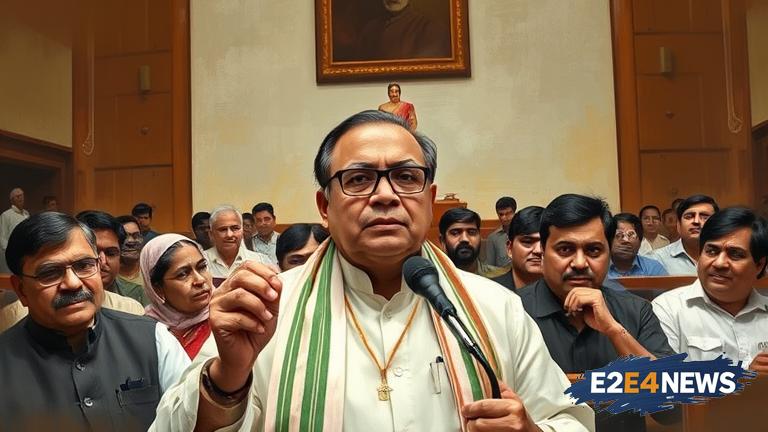The Indian Parliament’s Upper House, the Rajya Sabha, witnessed a ruckus recently, with opposition parties protesting against the government’s policies. Amid the chaos, Bharatiya Janata Party (BJP) President JP Nadda made a statement that has sparked controversy. Nadda offered to provide tuition to the opposition parties on how to work as an effective opposition. The remark was met with strong reactions from the opposition, with many leaders condemning Nadda’s statement as arrogant and dismissive. The opposition parties have been protesting against the government’s handling of various issues, including the economy, farmers’ welfare, and social justice. The BJP, however, has maintained that the opposition is merely trying to disrupt the functioning of the House. Nadda’s statement has been seen as a reflection of the BJP’s confidence in its majority in the Lok Sabha, the Lower House of Parliament. The opposition parties, on the other hand, have accused the BJP of trying to undermine their role in the democratic process. The Rajya Sabha has been witnessing frequent disruptions in recent times, with the opposition parties demanding discussions on various issues. The government, however, has been accused of not allowing meaningful debates to take place. The situation has led to a stalemate, with neither side willing to budge. The opposition parties have been demanding that the government address their concerns, while the BJP has maintained that it is committed to fulfilling its electoral promises. The controversy surrounding Nadda’s statement has highlighted the deepening divide between the ruling party and the opposition. The opposition parties have accused the BJP of trying to polarize the political landscape, while the BJP has maintained that it is working towards the development of the country. The situation in the Rajya Sabha is likely to remain tense in the coming days, with the opposition parties gearing up to protest against the government’s policies. The BJP, however, is confident that it can manage the situation, given its majority in the Lok Sabha. The controversy has also sparked a debate on the role of the opposition in a democratic system. While some have argued that the opposition should play a constructive role, others have maintained that it is the duty of the opposition to hold the government accountable. The situation in India is being closely watched by political analysts, who believe that the current turmoil could have long-term implications for the country’s democratic system. The opposition parties have vowed to continue their protests, while the BJP has maintained that it will not be intimidated by the opposition’s tactics. The controversy surrounding Nadda’s statement has also raised questions about the BJP’s approach towards the opposition. While some have argued that the BJP is trying to undermine the opposition, others have maintained that the party is simply trying to assert its dominance. The situation is likely to remain complex, with both sides dug in their positions. The Indian people are watching the developments closely, with many expressing concern about the impact of the political turmoil on the country’s development. The opposition parties have accused the BJP of prioritizing its political interests over the needs of the people, while the BJP has maintained that it is working towards the welfare of all Indians. The controversy has also sparked a debate on the role of the media in reporting political developments. While some have argued that the media should play a more neutral role, others have maintained that it is the duty of the media to hold those in power accountable. The situation in India is a reflection of the deeper challenges facing the country’s democratic system, including the need for greater transparency and accountability. The opposition parties have vowed to continue their fight for the rights of the people, while the BJP has maintained that it will not be swayed by the opposition’s demands. The controversy surrounding Nadda’s statement has highlighted the need for greater dialogue and cooperation between the ruling party and the opposition. The Indian people are hoping that the political leaders will put aside their differences and work towards the development of the country.





